

Table of contents
- Classic salad herbs
- dill
- Parsely
- chives
- chervil
- borage
- wild garlic
- Mediterranean salad herb mix
- oregano
- basil
- rosemary
- thyme
- sage
- Make your own herb salad mix
- preserve the mixture
A delicious and healthy salad is part of almost every meal. So that it tastes really good, different salad herbs should be used. These are always quick to hand when a herb bed has been created with your favorite herbs. So there are always enough herbs to make the salad herb mixture yourself. Both the classic and the Mediterranean herbs can be planted in the bed, so a different mixture can be chosen for each salad.
Classic salad herbs
Even the grandmothers refined the Sunday salad with various classic salad herbs that they picked in their own garden. These include parsley, dill, chives, chervil also known as Maggi spice and borage. Wild garlic has also become increasingly popular as a herb for salads in recent times, as it does have the garlic aroma, but the consumer does not later exude the typical smell. The basic mixture should always consist of parsley, dill and chives. The other herbs can be added according to taste and desire.
dill
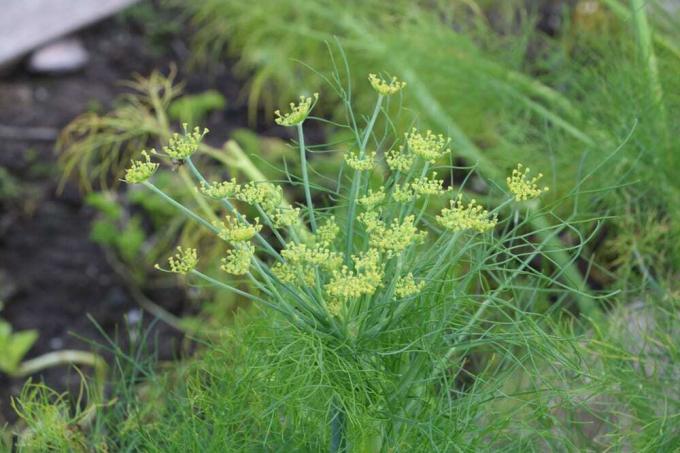
Dill is an aromatic herb that is used not only in salads but also in many other dishes. The annual herb is ready for harvest in summer. Freshly harvested dill should be used immediately, otherwise it will quickly turn yellow when stored. The taste is characterized as follows:
- mild
- herbaceous
- especially the tips are used
Tip:
So that the tasty dill does not lose its essential oils, it should only be added to the salad dressing shortly before serving.
Parsely

There are two known types of parsley, one of the oldest kitchen herbs, the curly and the flat-leaf parsley. In both varieties, the leaves are feathery and resemble the leaves of celery. The main advantage of parsley is that it is a biennial plant that regrows over the summer months, providing a bountiful harvest. The taste of parsley is very intense and spicy, with the smooth variety being spicier than the curly one, making it better for a salad.
chives
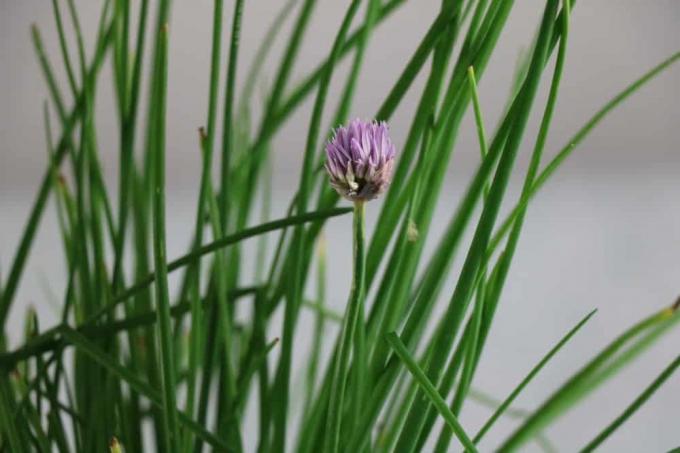
If you don't like using onions in your salad, you can alternatively use chives in your salad herb mix. Because chives have an onion-like taste, grow back again and again throughout the year and can therefore be harvested again and again throughout the warm months. The fine stalks are cut with sharp scissors or a knife and thus unfold their essential oils, which mainly include sulphides, which are also found in the onions.
Tip:
If the chives begin with the blue-purple blossom, the blossoms can add a decorative touch to the salad, as they are also edible. The colorful flowers can simply be placed whole on top of the salad.
chervil

Even if the tasty chervil is mainly used in soups and stews, it also makes the herb mixture for the salad even spicier. The leaves are similar to those of parsley, but the taste is different. For example, chervil was discovered in the industry many years ago for the popular Maggi spice and has been known by this name ever since. The typical taste is characterized as follows:
- fennel
- anise
- Parsely
After flowering, chervil loses its aroma and should therefore be harvested and processed before flowering to make your own mix of salad herbs.
Tip:
Chervil is always a component of "fines herbes" a well-known French herbal mixture.
borage
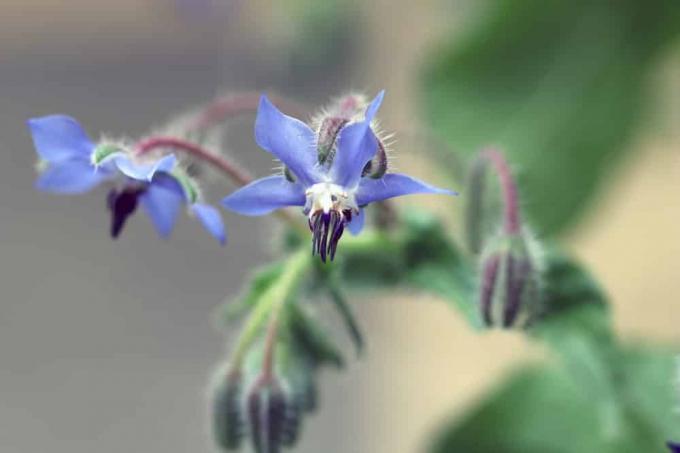
Borage is also called cucumber herb because the taste of the herb harmonizes particularly well with cucumber. This tasty herb should therefore always be part of a herb mixture for a cucumber salad. Borage has the following distinctive properties:
- Leaves are rough and hairy
- belongs to the borage family
- grows very briefly in summer
- Essential oils give off a scent of cucumber
If borage and dill are used together, then this is the ideal flavor complement.
Tip:
Borage is not only one of the salad herbs, but is one of the seven kitchen herbs that are used for the Frankfurt green sauce.
wild garlic
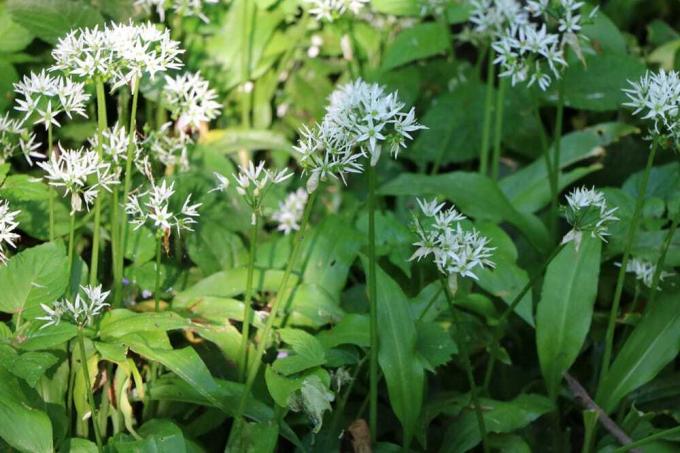
Wild garlic exudes a pleasant garlic aroma without leaving the typical smell after consumption. For this reason, the tasty wild garlic has become increasingly popular in the kitchen in recent years. Wild garlic can no longer be missing in a herb mixture for fresh salads. The herb is also considered a medicinal herb and can be used for the following ailments:
- abdominal pain and bloating
- problems falling asleep
- problems with the voice
- as a trigger of labor in overdue pregnant women
Tip:
Wild garlic found in nature can easily be confused with the very poisonous lily of the valley. Therefore, when harvesting, if it does not come from your own garden or a greengrocer, you have to be very careful. The smell of garlic must be recognizable.
Mediterranean salad herb mix
If you would like to be reminded of your last holiday in Provence or if you have a Mediterranean taste wishes, there are other Mediterranean herbs for him, which are also not missing in the salad herb mixture may. These include wild oregano and basil. Depending on taste, rosemary, thyme and sage can also be added.
oregano
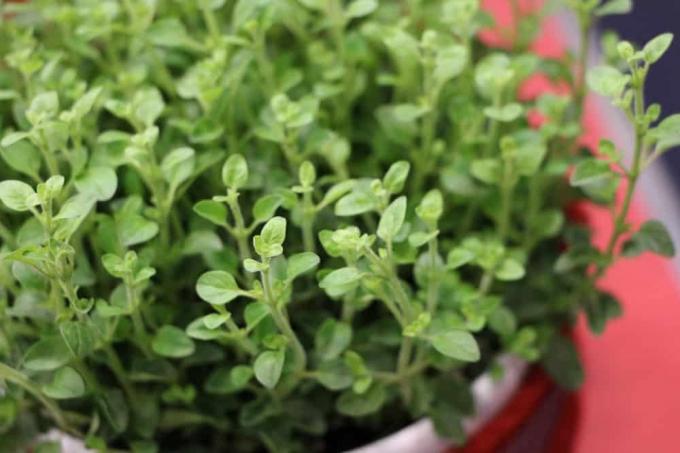
If you want to make a Mediterranean herbal mixture yourself, you can't do without oregano. This is characterized above all by the fact that it is used dried in the kitchen. Oregano is a herb that grows mainly in mountainous regions such as Greece. Here the herbs are collected and dried and can be purchased in stores. If you want to serve a Greek farmer's salad, you can't do without oregano. The tasty kitchen herb can also be cultivated in the home garden bed. The plant is characterized by:
- resilience
- Winter and frost hardiness
- perennial
- Flowers, stems and leaves can be used
basil
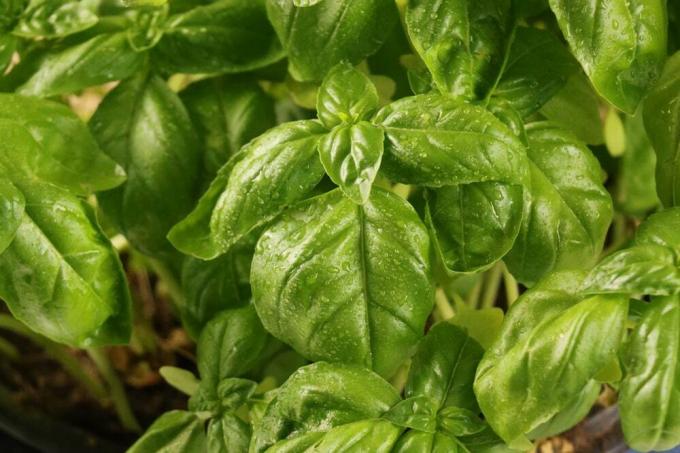
In Mediterranean cuisine, a dish without basil is hard to imagine. The herb also belongs above all in a homemade herb mixture for the Mediterranean salad. The taste of the real basil is mainly reminiscent of pepper with a sweet and aromatic note. The fresh basil is mainly served with eggplant, zucchini and especially tomatoes.
rosemary
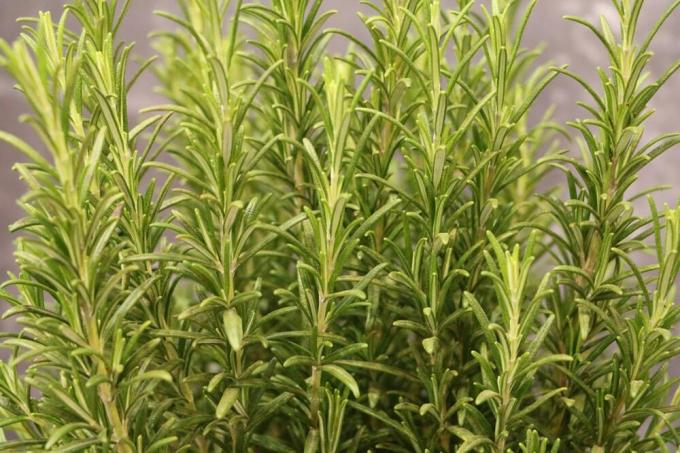
The needle-like rosemary has been known since ancient times and is very popular because of its essential oils and must therefore not be missing from the Mediterranean mixtures of salad herbs. If you plant a rosemary bush in your garden, you will enjoy the aromatic herb for a long time. The needle-like leaves are used in the kitchen and have a taste reminiscent of eucalyptus and camphor.
Tip:
In France, rosemary is always part of the herb mixture "Herbs of Provence" to which thyme and oregano are also added.
thyme
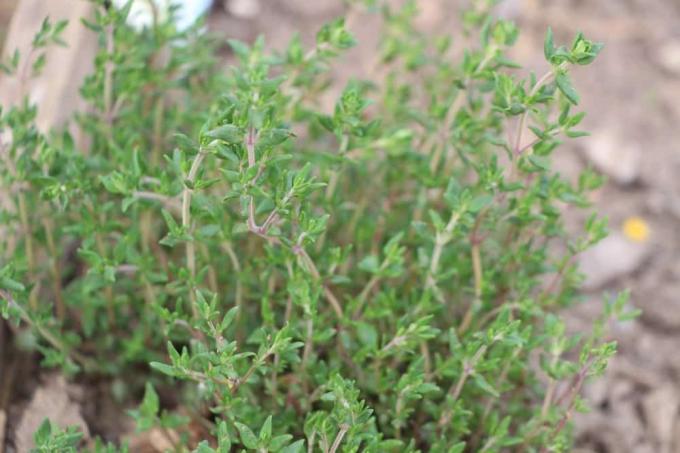
Thyme is not only known as a tea, but also in a Mediterranean mixture of salad herbs. Its slightly peppery, piquant and yet sweet to sweet taste is unique among herbs. The herb has the advantage that in dried form it intensifies its aroma. Thyme is actually an indispensable part of a salad herb mixture with oregano and rosemary. The easy-care herb can also be cultivated in your own garden or in a balcony box and is therefore always available.
sage
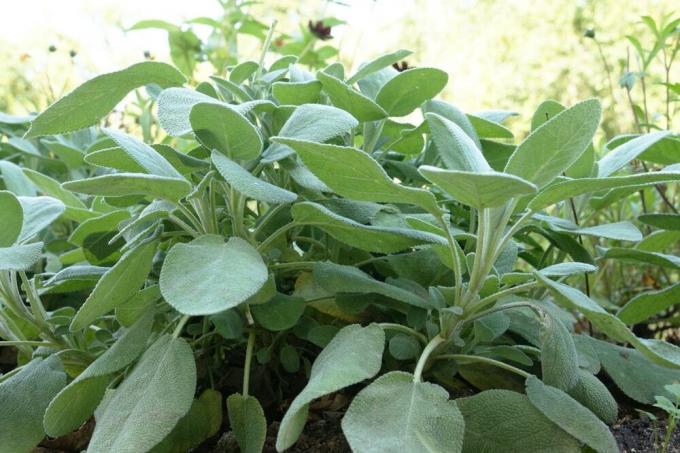
The white felted leaves and the aromatic scent are typical of sage. If you want to make a Mediterranean herbal mixture yourself, you should not do without sage. It can be cultivated well on the balcony or in the garden for your own harvest, as the plant is quite undemanding. Sage exhibits the following properties:
- slightly bitter
- spicy
- Flowers also edible
- especially good accompaniment to tomatoes
- young leaves are milder
Make your own herb salad mix
In order to create a tasty and healthy salad dressing, it is important to treat the herbs correctly. If these are prepared incorrectly, they lose their essential oils and healthy ingredients. Even fresh herbs picked straight from the garden bed or window box are no longer as healthy as you might think if they are treated incorrectly. Therefore, when preparing the mixture, attention should be paid to the following:
- always use a sharp knife
- alternatively sharp scissors
- this is how the herbs are cut
- often crushed with a blunt knife
- then essential oils come out
Once the herbs have been cut into small pieces, they only need to be mixed with the desired vinegar or oil Mix flavor or yoghurt and a pinch of salt and pepper and the homemade one is ready Salad dressing. Sour cream also tastes good as an alternative to yoghurt.
preserve the mixture
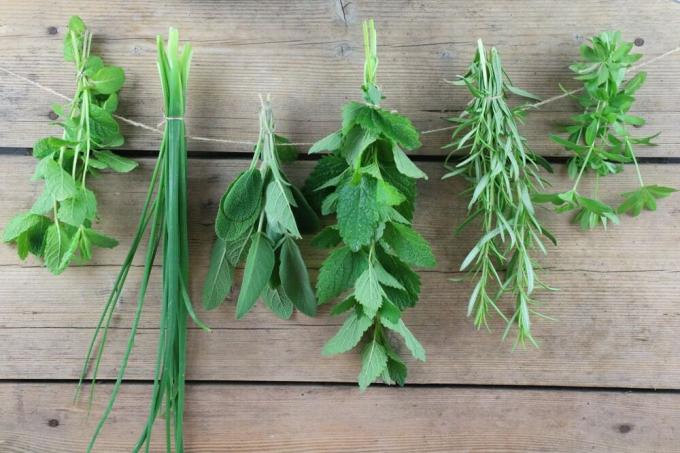
The homemade salad herb mixture can also be preserved. The advantage here is that the work only has to be done once and the mixture is then available. There are two ways to preserve herbs. They are either frozen in portions or dried. Freezing is recommended here, as the mixture will keep in a closed container or bag in the freezer for over a year. Dried herbs, on the other hand, tend to lose their flavor over time. When preserving, proceed as follows:
- harvest fresh herbs
- chop with a sharp knife
- create the desired mix
- Freeze portions in small containers
- alternatively also in small freezer bags
- put in the freezer
- alternatively dry the mixture on a flat surface
- also possible on a baking tray in the oven at low heat
- Place dried herbs in an airtight container
If required, the dried herbs can be used immediately and the frozen salad herbs can be used with the others after thawing Ingredients such as vinegar, olive oil or yoghurt as well as a pinch of salt and pepper are mixed together to form the desired salad dressing become.
Tip:
If you like variety, you can make different salad herb mixtures, each with different herbs. Here, however, the labeling must not be forgotten.
 garden editorial
garden editorial I write about everything that interests me in my garden.
Learn more about herbal recipes

Make herbal lemonade yourself | 12 delicious recipes
Herbal lemonades are delicious, thirst-quenching and healthy and easy to make yourself with the right recipe. A long-lasting supply can be built up with homemade syrup made from herbs. At Hausgarten.net you will find the best recipes to make yourself.
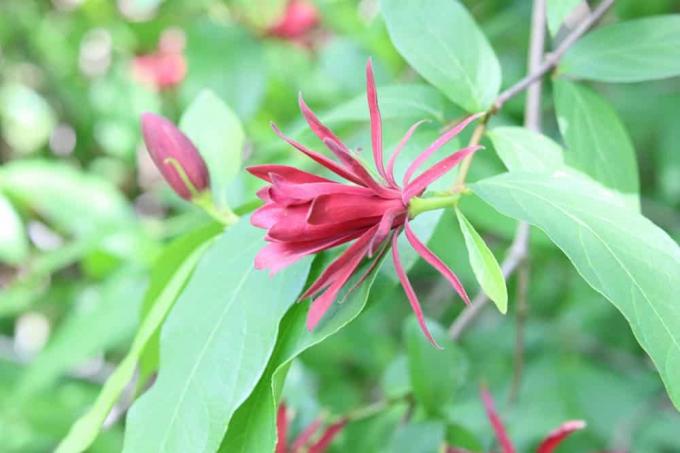
Real spice bush, Calycanthus floridus: care from A to Z
The spice bush brings a spicy scent to the garden. It is reminiscent of cinnamon, camphor and other spices. In the flowering period, it looks very attractive with its rust-red flowers. Caring for the garden is not very demanding. There are tips on how to do this in the guide.

Make herbal salt yourself | 7 recipes for fresh & dried herbs
Making herbal salt yourself is easy and practical. Because fresh herbs can easily be preserved with it and an individual spice mixture can be prepared. Suitable recipes for fresh and dried herbs can be found here.
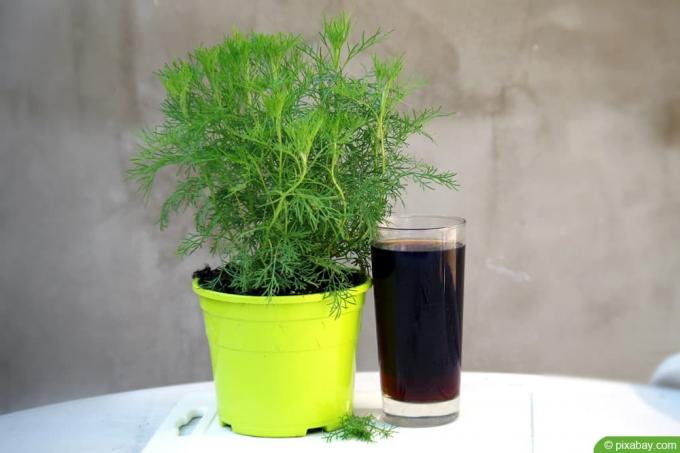
Colakraut Syrup - How to make cola without caffeine & 4 delicious recipes
Colakraut is also known under the name southernwood and has - as the name already suggests - an intense cola aroma. With the right recipes, syrup, lemonade and liqueur can be made from it. Here we tell you how you can do it yourself.

15 tips for cutting, propagating, harvesting & drying olive herb
While thyme can be found in almost every herb bed, the olive herb is considered an exotic rarity with its comparable, spicy taste. The gardener gives a lot of thought to the preservation of the small peculiarities of his garden. "How should I prune the plant and when can I harvest the herb?" In this guide he will find 15 helpful tips for the right cut, propagation and subsequent use.

Make your own herbal liqueur 5 recipes for herbal schnapps
After a hearty meal or when you have a stomach ache, a herbal schnapps works wonders. Icons in the herbal liqueur heaven, such as Jägermeister and Ramazotti, demonstrate a variety of pleasure variations and strictly guard their legendary recipes. These 5 recipes for herbal schnapps reveal how you can easily make the beneficial spirit drink yourself.



